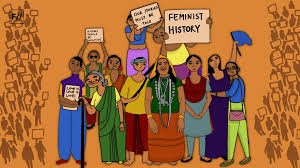Waseema Naeem
Han Kang, born on November 27, 1970, in Gwangju, South Korea, has emerged as one of the most influential voices in modern literature. Known for her poignant, often haunting prose, she achieved international acclaim with her novel The Vegetarian, which won the prestigious International Booker Prize in 2016. In 2024, Han Kang made history by becoming the first Asian woman and first Korean to be awarded the Nobel Prize in Literature, cementing her place as a literary giant.
Han Kang’s literary roots run deep. Her family has a strong literary background, with her father, Han Seung-won, being a novelist, and both her brothers also pursuing literary careers. Han’s formative years were spent in Seoul after her father transitioned to full-time writing. It was during this period that Han became deeply influenced by the events surrounding the Gwangju Uprising of 1980, a pro-democracy movement that ended tragically with a military massacre. The discovery of photographs from this period profoundly shaped her understanding of humanity and her future work.
Han’s education was grounded in Korean language and literature, culminating in a degree from Yonsei University in 1993. Her literary career began with the publication of her first short story, “The Scarlet Anchor,” in 1994, and her first short story collection, A Love of Yeosu, was published the following year. This collection earned Han recognition for her skillful narrative structure and attention to detail, marking the beginning of a distinguished career in writing.
Although Han began her career in the world of poetry and short stories, it was The Vegetarian that brought her global recognition. The novel, translated into English by Deborah Smith, tells the story of Yeong-hye, a woman who, in a bid to escape the constraints of her life, decides to stop eating meat. The novel delves deep into themes of bodily autonomy, societal expectations, and personal rebellion, resonating with readers worldwide.
The Vegetarian made history in 2016, when it became the first Korean-language novel to win the International Booker Prize for fiction. This success propelled Han into the global literary spotlight, with The Vegetarian also being named one of The New York Times’s “10 Best Books of 2016.” Han’s exploration of themes related to violence, identity, and trauma in this novel left an indelible mark on readers and critics alike.
Following the success of The Vegetarian, Han continued to explore complex themes in her subsequent works, including Human Acts (2016), which examines the aftermath of the Gwangju Uprising through the eyes of various individuals. This novel earned her the Premio Malaparte in Italy and was shortlisted for the International Dublin Literary Award.
Han’s later works further solidified her reputation as a master of literary storytelling. The White Book (2018), a deeply personal novel about grief and loss, was shortlisted for the 2018 International Booker Prize. We Do Not Part (2021), which explores the impact of the 1948-49 Jeju uprising on a friend’s family, won the Prix Médicis étranger in 2023. Her 2023 novel Greek Lessons received critical acclaim, with The Atlantic calling it a work that deals with the insufficiency and excess of language.
Pl subscribe to the YouTube channel of republicpolicy.com
Throughout her career, Han Kang’s writing has been noted for its exploration of historical trauma, human fragility, and the emotional intricacies of life. Her works resonate globally, touching on universal themes while also being deeply rooted in the specific cultural and historical experiences of Korea.
Though her personal life has remained relatively private, Han has spoken candidly about the challenges of balancing her literary career with family life. She was married to Hong Yong-hee, a literary critic, but they have been separated for many years. Han has a son, and for a time, she and her son ran a bookstore in Seoul, which she stepped down from managing in November 2024.
Han has also spoken about her struggles with migraines, which she credits with “keeping her humble.” Despite her successes, she maintains a grounded approach to her work and life.
Awards and Recognition
Over the years, Han Kang has earned numerous awards and accolades for her literary contributions. Some of her notable awards include:
- 1999: Korean Novel Award for Baby Buddha
- 2005: Yi Sang Literary Award for Mongolian Mark (part of The Vegetarian)
- 2016: International Booker Prize for The Vegetarian
- 2017: Malaparte Prize for Human Acts
- 2024: Nobel Prize in Literature
Han was also chosen as one of the contributors to the Future Library project in 2018, where her manuscript, Dear Son, My Beloved, was handed over to the project with a symbolic gesture reflecting Korean cultural practices.
Nobel Prize in Literature
In 2024, Han Kang’s literary achievements were crowned with the Nobel Prize in Literature. The Swedish Academy awarded her the prize for her “intense poetic prose that confronts historical traumas and exposes the fragility of human life.” This recognition makes Han the first Korean and first Asian woman to receive this honor. The Nobel Prize highlights her unique ability to blend personal and national history into evocative, emotionally resonant works that challenge and inspire readers worldwide.
Han Kang’s literary journey has been marked by both personal reflection and a keen engagement with the broader social and historical issues of Korea. From her early influences surrounding the Gwangju Uprising to her exploration of personal trauma and identity in her novels, Han’s work speaks to the universal struggles of the human condition. As the recipient of the Nobel Prize in Literature in 2024, she has rightfully earned her place among the literary greats, offering a powerful voice to the fragility and resilience of life.
Through her powerful narratives, Han Kang continues to redefine the boundaries of contemporary literature, inspiring future generations of readers and writers around the world.
















